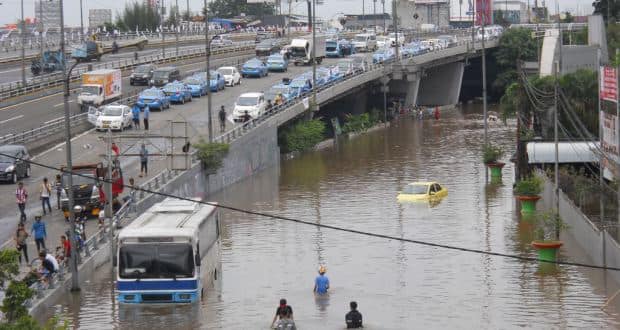There are no products in your shopping cart.
| 0 Items | £0.00 |


By Ayo Akinfe
(1) It is the rainy season in Nigeria again and as ever, we are once more subjected to annual flooding. Can we just put things into perspective, it is not as if we suffer from Monsoon storms or La Niña, it is just that there is no drainage to carry away excess water. Our villages, towns and cities only get something like a 20% increase in water during the rainy season
(2) In the southern part of the country, the rainy season begins in the late weeks of February/early weeks of March and ends in October. It peaks in June with heavy rainfalls around this time. In northern Nigeria, the raining season begins in the month of June/July and ends in September. Most parts of northern Nigeria experience the peak of the rainy season during the month of August, although not as high as the heavy rainfall experienced in southern Nigeria
(3) Just to put everything into perspective, across Nigeria, the average annual total rainfall ranges from 1,510 to 2,253 mm. This compares with the average seen in Meghalaya in India of 11,873 mm and that of Australia’s Mount Bellenden Ker which stands at an average of 8,000 mm per year. So it is not as if we suffer a deluge. We simply do not have the infrastructure to deal with it
(4) Nigeria is one of those countries with just two seasons - Rainy season and Harmattan season. One of the advantages of having just two seasons is you can plan a lot of things around them as it just involves two templates. Agricultural production, road construction and above all power generation can easily by structured and planned when you only have two seasons
(5) Every nation with heavy rainfall structures its hydro-electric power policy around the period of heavy rains. This is when your reservoirs are the most full and your plants are working flat out. What you do during the rainy season is open up standby reservoirs, fill up artificial lakes and bring out those turbines you have held in reserve to maximise power generation
(6) We know that the Rivers Niger and Benue are going to overflood over the coming months, so now should be the time to open up auxiliary lakes in Lau and Ibi in Taraba State, Jimeta and Numan in Adamawa State, Mamba, Agwara and Katcha in Niger State, Idah and Lokoja in Kogi State and Yelwa in Kebbi State. We should generate excess power during this period and store it
(7) Unfortunately, Nigeria has no such auxiliary or contingency plans. When the rains fall, we swim in the deluge, our villages and cities get flooded and we continue to remain in darkness, refusing to exploit the hydro-electric potential of the situation. Maybe we are hoping that a flood similar to that of Noah’s will wipe us out and we can start afresh. Maybe when more of us perish as Pharaoh’s army did in the Red Sea we will come to our senses
(8) I actuality believe that Yelwa in Kebbi State should have a massive hydro-electric power plant generating at least 1,000MW. This facility should have a monument, conference centre, five star hotel, etc attached to it with the town serving as a global tourist attraction because it is where Mungo Park died. You see, when you have intellectually lazy governors, poverty will remain your ID card forever. All these states are waiting for the federal government to come and build reservoirs for them. As far as I am concerned, Kebbi State does not need one kobo in federal allocation to survive
(9) When you look at our cities too, it does not actually take a lot to built drainage networks. All you do is build gutters, cover them and connect them together into a network that flows to a common source. This could then serve as an artificial lake to generate power or you could drain it into a river, or if you are a coastal state into the Atlantic Ocean. In principle, the federal government should refuse to come to the rescue of anyone. If any state cannot build a drainage network in its towns and cities, let the people drown and perish like fools
(10) I am sure these are the kind of projects the African Development Bank had in mind when it spoke about Nigeria having an annual infrastructure deficit of $100bn. I am pleased that this week, Vice President Osinbajo went a step further to say we actually need to invest $140bn in our infrastructure. However, the burden is not the sole responsibility of the federal government. At the very least, 50% of such projects have to be undertaken by our states